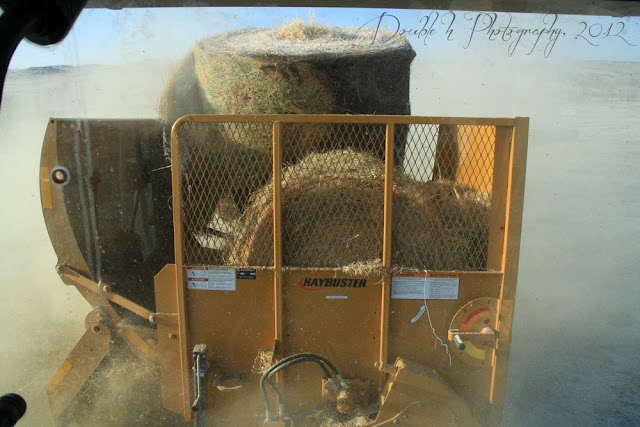We purchased a hay buster this winter. This is a machine that grinds up hay and feeds it onto the ground, or into a bunk, for livestock. The benefit of grinding hay is livestock can better consume and digest hay if it's already been ground into smaller pieces. We are utilizing this machine to make some of the poorer quality hay we have on hand more palatable to our calves. If we didn't grind it,they would pick through it and consume less of the total volume of hay we fed them due to its coarseness. It still has nutritional value, but in its whole form it's not as appealing to the calves.
Here are the controls, which run the hay buster. The lever with the blue tape and handwriting on it is used to run the arms, and pick up hay bales and drop them into the grinder. The red-handled lever next to the blue one, and the lever on the right side of the photo that slides back and forth are used to feed the bale once it's in the grinder. Just ignore the rest of those controls for this job : )
Here is what the inside of the hay buster looks like. When you adjust the levers in the cab appropriately, the chains in the bottom move, and the whole unit works to tear the hay bale into smaller pieces, and shoot it out the side on the left in the photo.
As the feeder, this is how it looks to drive the tractor. The calves love their hay, and often start heading toward the house when they hear the tractor start in the morning.
When you reach the feed grounds, there is a specific order to things. First, you get the tractor, which is a manual and has two gear shifting knobs (technical terminology at its finest), and a lot of gear choices. You need to get into a relatively low (slow) gear.
Second, you have to turn on the lever that slides in the photo of the controls, and let it get up to speed. I apologize for those of you that know all the accurate terminology. I am not that mechanical, I just know how to run the stuff.
Third, you let out the clutch and start moving, while pushing the red handled lever forward, which turns on the actual grinder.
The result is that the hay bale starts spinning as the grinder chews it up and spits it out on the ground. You can manually adjust how coarse or fine it will chop the hay, and how wide of a pile it spits out on the machine. The size and width of the pile on the ground is also impacted by how fast or slow you drive.
The second bale just rests on the back until you're done feeding the first. Then you run the arm control to dump it into the grinder.
Here's what it looks like from outside the tractor.
Feeding, like most ranch tasks, can be a dirty, dusty job.
But the calves don't mind.
Then, when you're done with the last bale, you pull the red handled lever back, turn off the one that slides, and head for home.
This is what the hay looks like after being run through the buster. We don't have it set to chop the hay extremely fine, partially because we're feeding on the ground. But, the difference in palatability is noticable, and my dad is just tickled with his purchase.












No comments:
Post a Comment